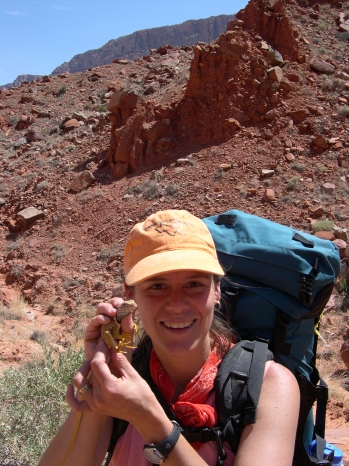VIEWPOINT
Blurring the lines between work and play
"… and can you believe we get paid for this?"
That was my undergraduate mentor speaking -- standing on top of a rock outcrop in central California with a lizard he had just captured dangling from a noose at the end of a pole. We were studying the evolution of egg size in lizards to better understand how the environment shapes decisions that females make when allocating energy to reproduction. I was hooked.

Associate professor Kelly Zamudio with a lizard while on vacation in Utah. See larger image
It was my sophomore year, and my mentor had already included me in both field and lab aspects of this project. Almost daily during the summers and the academic year I worked on this project, either gathering data on lizards in the field or raising eggs in the lab. Our association was mutually beneficial -- for those opportunities, I paid him back with my hard work and some very long hours.
It was my undergraduate research experience that first made me realize the line between work and play could be blurred, and it was this sentiment that my mentor was expressing on the rock outcrop that day. Of course, it isn't always fun and games, but the process of scientific discovery is continually engaging because it offers us the opportunity to explore and explain some of the unanswered questions about the natural world -- and those questions never end. I credit my undergraduate experiences for jump-starting in me this view of science.
My experiences shaped my approach with the undergraduate researchers who are now in my own lab. I like to think of my lab as a place of blurry lines, where students are drawn in because of their projects but don't necessarily think of their time there as work. It's a place where undergraduates come to collect data, but also where they find conversation about science and the latest findings and the opportunity to observe and participate in academic life.
An academic lab is a perfect environment for undergraduates, because professors, graduate students and postdocs form a critical mass of productive scientists who are excellent and varied examples of how people approach their work. It is only by interacting with and behaving as academics that undergraduates will be able to evaluate whether this is the path for them and be better prepared for beginning the next step in their careers.
One of the great rewards of my job is watching those undergraduate students change over time. I have done this long enough now that I can sometimes detect the point at which students are convinced that this is a job for them. Commonly, students start complaining that their classes are taking too much time from their research. Other times they will excitedly describe a result, saying, "Check out what I found!" In many cases, they will make the lab a second home and work incredible hours to finish data collection or a manuscript. That is when I know their research is not just an obligation, and although they may not realize why so much work gives them such satisfaction, I know it is because they are hooked on the process of science.
Kelly Zamudio is an associate professor of ecology and evolutionary biology and faculty curator of herpetology.